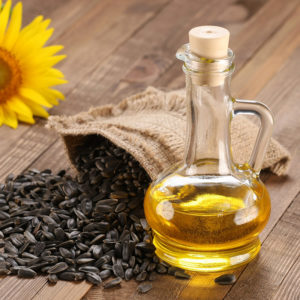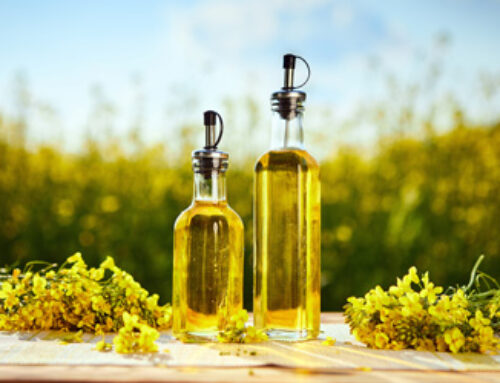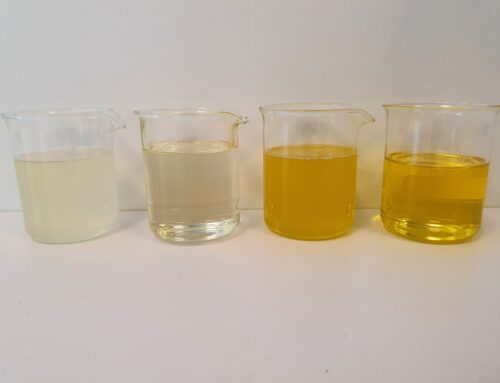So, What IS Organic High Oleic Sunflower Oil?
Sunflower oil comes in a variety of different options. If you’re new to the sunflower oil market, you may be scratching your head trying to figure out which sunflower oil will work best for your application. In this blog, we will focus on the components of organic high oleic sunflower oil and what makes it so special.
Organic sunflower oil is extracted from sunflower seeds, typically using a physical crushing process versus utilizing chemical extraction. Sunflower oil has a unique fatty acid profile. The composition of the fatty acid profile is what sets each type of sunflower oil apart. High oleic sunflower oil has a higher percentage of oleic acid when compared to the other fatty acids most commonly present in sunflower oil, which include stearic, linoleic, and linolenic acid.

Composition
High oleic sunflower oil is high in monounsaturated fat. It has a significant amount of monounsaturated omega-9 fatty acids, which is what “high-oleic” signifies. Monounsaturated fat (oleic acid) is one of the two “healthy” fats, along with polyunsaturated fat (linoleic acid). Monounsaturated fat, in particular, can help lower LDL (bad) cholesterol. High-oleic sunflower oil is typically comprised of 75 – 82 percent monounsaturated fat and around nine percent linoleic acid, a polyunsaturated fat. Whatever is leftover are saturated fats.
High-oleic sunflower oil comes from a specific strain of sunflower seeds that sunflower breeders created because the food industry needed an oil with a long shelf life that wouldn’t break down at high cooking temperatures. Traditional sunflower oil, also called linoleic sunflower oil, which is made up of about 20 percent oleic acid and 68 percent linoleic acid, is less stable than the high oleic variety. That’s because the chemical structure of monounsaturated fats in high oleic sunflower oil makes them less susceptible to oxidation.
Frying
High oleic sunflower oil is suitable for medium-high to high heat, with a smoke point of 450ºF. What is smoke point, you ask? That is an excellent question! Smoke point is a temperature at which it stops shimmering and starts sending out some serious smoke signals. Now, when it comes to actually cooking with fats, smoking oil isn’t always a bad thing—oftentimes, you’ll want that wok or skillet ripping hot. Heated past its smoke point, that fat starts to break down, releasing free radicals and a substance called acrolein, the chemical that gives burnt foods their acrid flavor and aroma. Having a high smoke point makes high oleic sunflower oilperfect for stir-frying, frying, and sautéing.

Product developers and food scientists often describe high-oleic sunflower oil as having a neutral flavor profile. Other people might describe it as tasteless. While that doesn’t sound like a positive trait if you’re drizzling it over a salad and looking for a flavor that screams “wow”, it’s perfect when you don’t want the oil to mess with other ingredient flavors. In addition, research shows that sunflower oil has a longer fry life than many other oils.
Organic
For high oleic sunflower oil to be organic, it must be certified by a third party to be free of pesticides and other bi-products. This implies that the farmers who grew the plants for the oil didn’t use pesticides or other artificial agents. Why should you opt for organic oil whenever possible? The overarching benefit is that organic is eco-conscious. Organic farming practices help restore soil vitality and prevent harmful chemicals from entering water supplies. The bottom line: using organic oil is better for our health and our planet earth. Today, the organic market is growing due to increasing demand for organically grown and made products. The organic high oleic sunflower oil produced and distributed by Spack International is certified organic by Quality Assurance International, or QAI.
For these reasons, organic high oleic sunflower oil is ideal in the snacks and chip making business. Combine the high monounsaturated fat content with the high smoke point, clean taste, long fry life and organic stamp and BAM! You’ve got a recipe for a healthy, delicious snack.
For USDA Organic Certification: QAI https://www.qai-inc.com
For more information on Spack products : https://spack-international.com/products/












